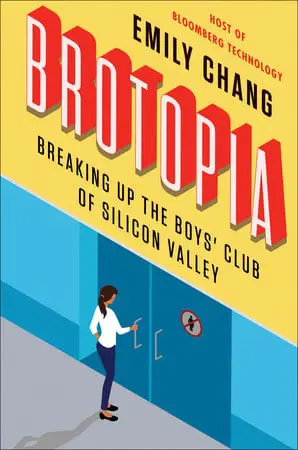To some extent, perhaps it makes sense. Think of the exorbitant money involved in tech today; think of how wealth has the propensity to skew reality. Maybe all this technological progress and capital gives way to a society of men who code— and women who acquiesce, just to try and take a crack at their world.
Here’s where we part company with some of the allegations; women are powerful, and they surely aren’t sheep being herded about at the nudge of a high class party invite or CEO offering them Molly. Maybe some, but we’d argue not the majority. We cannot neglect to mention companies like TaskRabbit, Brandless, Bumble, and LinkedIn that have women at the helm in a big way. To demand a close in the gender gap is imperative, but is it not also tremendously necessary to acknowledge and broadcast the women pioneers who are currently bridging said gap?
Sex sells, so it makes sense that certain angles of the overall issue are receiving more attention than perhaps the larger injustice present here. Articles of late tend to overfocus on the real issue at hand being the sex parties and double standard of who attends them. What perhaps should be the more pressing issue, however, is the professional, tangible chasm in effect between men and women in tech— i.e. pay scale, the lower number of women running companies, the influence of women during the 9-5 workday, not the 10-2 party scene.
Moreover, surely we can lend women in the Silicon Valley the agency to make decisions for themselves. Feeling forced to attend sex parties or wild lunches in order to run with the big dogs is definitely a problem; but if there is a facet of women that actually want to be in on this scene, it’s not our place to scrutinize them for doing so. In regards to this very point, however, “Brotopia” author Chang does offer insight, explaining that “Men actually get business done at sex parties and strip clubs. But when women put themselves in these situations, they risk losing credibility and respect.”
In this simple comment it seems quite clear: the parties are not the problem. The parties are just another manifestation of sexism in which whatever room a woman enters, more is asked of her, more is taken from her, and more is at stake for her, than a man living his life the same way.
While tech startups’ lifeblood runs potent through the Silicon Valley, this problem is a facet of startup culture across the board. Is anyone surprised by that? In New York, companies like ZocDoc have been publicly outed for similar “frat cultures” that offer men a stage from where they can develop their business acumen whilst also objectifying female coworkers with admitted relish. In response, monikers such as “Brogrammer” have entered today’s lexicon to identify young men who may be quite genius behind a keyboard, but also hold the less-than-endearing trappings of a college frat star.
On a more general note, the specifics don’t matter as much as the fact that a schism exists and, yet again, a great imbalance between the sexes is evident in one of the world’s leading industries. It would be a crime if in pursuit of making the apps, the technology, the robots so much more human, the people creating these things became less so. At risk of slip-sliding into this scare of hedonism and debauchery, it would be cool, bro, if the industry could wise up and perhaps be as smart as their phones.
// Illustration courtesy of Penguin Publications



title: “Bro It S A Problem Silicon Valley Is Under Sexist Fire” ShowToc: true date: “2022-11-24” author: “Robert Gill”
To some extent, perhaps it makes sense. Think of the exorbitant money involved in tech today; think of how wealth has the propensity to skew reality. Maybe all this technological progress and capital gives way to a society of men who code— and women who acquiesce, just to try and take a crack at their world.
Here’s where we part company with some of the allegations; women are powerful, and they surely aren’t sheep being herded about at the nudge of a high class party invite or CEO offering them Molly. Maybe some, but we’d argue not the majority. We cannot neglect to mention companies like TaskRabbit, Brandless, Bumble, and LinkedIn that have women at the helm in a big way. To demand a close in the gender gap is imperative, but is it not also tremendously necessary to acknowledge and broadcast the women pioneers who are currently bridging said gap?
Sex sells, so it makes sense that certain angles of the overall issue are receiving more attention than perhaps the larger injustice present here. Articles of late tend to overfocus on the real issue at hand being the sex parties and double standard of who attends them. What perhaps should be the more pressing issue, however, is the professional, tangible chasm in effect between men and women in tech— i.e. pay scale, the lower number of women running companies, the influence of women during the 9-5 workday, not the 10-2 party scene.
Moreover, surely we can lend women in the Silicon Valley the agency to make decisions for themselves. Feeling forced to attend sex parties or wild lunches in order to run with the big dogs is definitely a problem; but if there is a facet of women that actually want to be in on this scene, it’s not our place to scrutinize them for doing so. In regards to this very point, however, “Brotopia” author Chang does offer insight, explaining that “Men actually get business done at sex parties and strip clubs. But when women put themselves in these situations, they risk losing credibility and respect.”
In this simple comment it seems quite clear: the parties are not the problem. The parties are just another manifestation of sexism in which whatever room a woman enters, more is asked of her, more is taken from her, and more is at stake for her, than a man living his life the same way.
While tech startups’ lifeblood runs potent through the Silicon Valley, this problem is a facet of startup culture across the board. Is anyone surprised by that? In New York, companies like ZocDoc have been publicly outed for similar “frat cultures” that offer men a stage from where they can develop their business acumen whilst also objectifying female coworkers with admitted relish. In response, monikers such as “Brogrammer” have entered today’s lexicon to identify young men who may be quite genius behind a keyboard, but also hold the less-than-endearing trappings of a college frat star.
On a more general note, the specifics don’t matter as much as the fact that a schism exists and, yet again, a great imbalance between the sexes is evident in one of the world’s leading industries. It would be a crime if in pursuit of making the apps, the technology, the robots so much more human, the people creating these things became less so. At risk of slip-sliding into this scare of hedonism and debauchery, it would be cool, bro, if the industry could wise up and perhaps be as smart as their phones.
// Illustration courtesy of Penguin Publications


